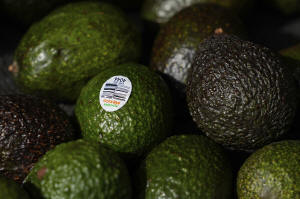Groceries around the country remain expensive. That's why more states
want to stop taxing them
[March 05, 2025] By
ANDREW DeMILLO
LITTLE ROCK, Ark. (AP) — The number of states imposing sales taxes on
groceries has shrunk over the years, and the number may decrease further
in the coming months as lawmakers hear complaints about high prices for
eggs and other household staples.
Arkansas Gov. Sarah Huckabee Sanders on Tuesday unveiled the details of
her proposal to eradicate the remaining 1/8th of a cent sales tax the
state levies on groceries. Lawmakers in Tennessee, Mississippi and
Alabama and are also calling for grocery-tax reductions.
The efforts come as states face uncertainty about their budgets because
of cuts in Medicaid and other federal programs being eyed by Republicans
in Washington. But supporters of the tax cuts are citing headlines about
soaring egg prices as the reason they are needed now.
“We’re getting rid of Arkansas’ most regressive tax and giving a helping
hand to those who need it the most,” Sanders, a Republican, said at a
news conference to discuss the proposal.
The number of states taxing groceries has decreased in recent years,
with laws eliminating the state levy taking effect in Oklahoma and
Kansas over the last year. A law eliminating Virginia's tax on groceries
took effect in 2023. A law eliminating Illinois' 1% grocery tax is set
to take effect next year.
State sales taxes are levied on groceries in nine states: Arkansas,
Hawaii, Idaho, Illinois, Mississippi, Missouri, South Dakota, Tennessee
and Utah. Hawaii and Idaho offer tax credits to residents to help offset
the tax, though.

In Tennessee, Republican legislative leaders have proposed abolishing
the state’s 4% sales tax on groceries. The legislation comes after the
state’s handful of Democratic lawmakers have unsuccessfully introduced
similar proposals as they argue that Tennesseans are paying as much as
6.75% in sales tax on essentials like bread and milk in some areas with
local sales taxes.
However, it is unclear how far even a GOP-backed bill will fare in
Republican-dominant Tennessee. State revenues are expected to be tighter
this year, and Gov. Bill Lee didn’t include a cut in his proposed
budget, nor did he include a grocery sales tax holiday that has
typically been included in his legislative priorities.
House Majority Leader William Lamberth, one of the sponsors of the
repeal, said the bill could be narrowed down to only apply to essentials
hitting people’s pocketbooks the hardest rather than junk foods.
“Milk, eggs, bread, I mean, that’s a great place to start,” Lamberth
said.
[to top of second column] |

Avocados sit at a grocery store in San Francisco, Tuesday, March 4,
2025. (AP Photo/Godofredo A. Vásquez)
 Alabama Democratic lawmakers plan to
introduce tax cut legislation that will include eliminating the
state’s remaining 3% grocery tax. Lawmakers in 2023 approved
legislation to gradually drop it from 4% to 2%.
Democrats said families need relief.
“If we’re serious about helping working people get
ahead, the best and most impactful way to do that is to take less in
taxes and give them some peace of mind when they pay the rent or go
to the grocery store,” Democratic Rep. Adline Clarke said in a news
release.
Lawmakers have for decades have discussed removing the tax, but the
proposals never came to fruition because of the loss it would cause
to education funding.
A tax cut package moving its way through the Mississippi legislature
would cut that state's 7% sales tax on groceries.
Other grocery tax cut proposals have run into obstacles. South
Dakota voters last year rejected a ballot measure that would have
repealed the state's grocery tax.
Arkansas had all but eliminated the grocery tax under Sanders'
predecessors, Democratic Gov. Mike Beebe and Republican Gov. Asa
Hutchinson. All that remains is the 1/8th sales tax that's applied
under a voter-approved constitutional amendment for outdoors
programs.
Eliminating that will cost Arkansas nearly $11 million a year, a
figure Sanders said the programs can absorb.
Reducing or getting rid of grocery taxes can make a state's tax
system less regressive, but it comes at a time that states face the
potential of additional costs because of federal budget cuts.
States could instead look at other cuts such as earned income tax
credits or child care tax credits, said Aidan Davis, state policy
director for the Institute on Taxation and Economic Policy.
“If the goal is to make sure people can make ends meet, then I think
doing it in a more targeted way makes a lot of sense,” Davis said.
___
Associated Press writers Kimberlee Kruesi in Nashville, Tennessee,
and Kimberly Chandler in Montgomery, Alabama, contributed to this
report
All contents © copyright 2025 Associated Press. All rights reserved |